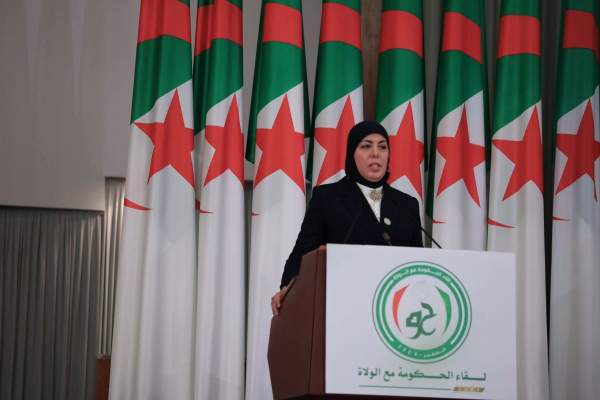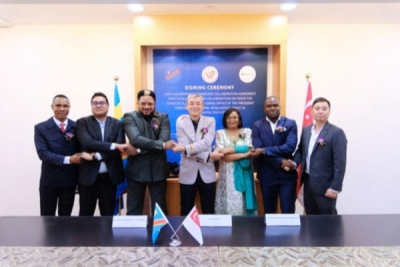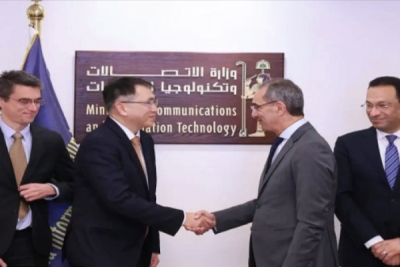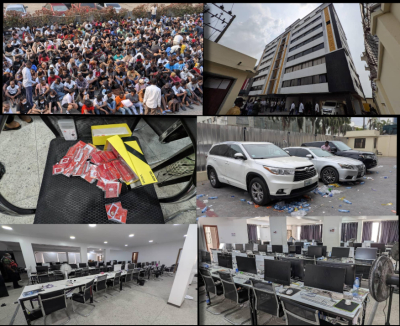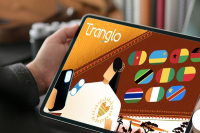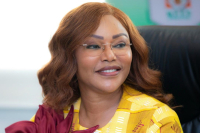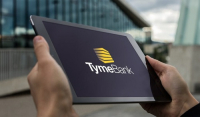
News (1796)
Algerian authorities are intensifying their push to accelerate the country's digital transformation. After a year of significant progress on numerous projects, a clear vision for the future is emerging.
Algeria commits to accelerating its digital transition with the launch of more than 500 projects between 2025 and 2026, with 75% of them focused on the modernization of public services. The plan was announced on Tuesday by Meriem Benmouloud, High Commissioner for Digitalization, during a meeting between the government and provincial governors.
"Algeria is undergoing a clear transition toward digitalization, requiring collective efforts to achieve the desired digital transformation and position Algeria at the forefront of global rankings," said Benmouloud. She explained that these projects represent a major step forward in making public services more accessible and transparent.
The initiatives align with the “Digital Algeria 2030” strategy, which is currently under development. This strategy revolves around five key pillars: infrastructure, training, digital governance, digital economy, and digital society. One of its flagship measure is the creation of an Interactive National Portal for Digital Services and an interoperability platform. These tools aim to centralize administrative procedures, reduce unnecessary travel, and improve access to information, particularly for those in remote areas.
Despite this momentum, additional efforts are needed to strengthen e-governance. Algeria ranks 116th out of 193 countries in the 2024 United Nations E-Government Development Index (EGDI), with a score of 0.5956. While this marks a modest improvement from its 2022 score of 0.5611, the new projects are designed to enhance Algeria’s competitiveness and establish it as a regional leader in digital transformation.
By Samira Njoya,
Editing by Sèna D. B. de Sodji
Last year, the Mozambican government announced plans to introduce a digital economy tax beginning in 2024. Today, the focus of this tax has narrowed, specifically targeting foreign digital companies operating within the tourism sector.
The Mozambican Tax Authority (AT) recently drafted a bill to formalize the taxation of online transactions in the tourism sector. This initiative targets platforms such as Booking, Tripadvisor, and Hotels.com, aiming to regulate the digital economy and boost the country’s tax revenues.
Currently, these platforms collect commissions on bookings made for Mozambican tourist establishments without contributing to the national tax system. The proposed legislation, set to be introduced in the next legislative session, seeks to close this gap by taxing the income these companies generate in Mozambique.
Amorim Ambasse, director of the Digital Economy Taxation Unit at the Mozambican Tax Authority, explained that although these platforms lack a physical presence in Mozambique, they generate significant revenues that should be "taxable because they stem from economic activities conducted within Mozambique's borders."
This move comes against the backdrop of robust growth in Mozambique’s tourism sector. In 2023, tourism revenues reached $221.2 million, marking a 10.4% increase compared to 2022, according to Eldevina Materula, Minister of Culture and Tourism. The number of international arrivals also rose sharply, surpassing 1.1 million visitors in 2023—a 31% increase from the previous year.
The proposal aligns with a broader national strategy to regulate and tax the digital economy. By targeting foreign digital platforms, the government aims to not only enhance tax collection but also establish a level playing field for local businesses and foster healthy competition.
If enacted, this measure could magnify the impact of digital technology on Mozambique’s economic growth. It would enable the country to contribute to the $712 billion that Africa’s digital economy is projected to generate by 2050, according to estimates from the International Finance Corporation and Google.
By Melchior Koba,
Editing by Sèna D. B. de Sodji
Digital technology is rapidly transforming public administrations across Africa. This transformation is enhancing service efficiency and improving citizens' access to essential resources.
The Democratic Republic of Congo (DRC) signed a preliminary agreement on Thursday, December 19, with Trident Digital Tech Holdings Ltd, a Singaporean company specializing in digital transformation. This agreement establishes a framework for collaboration to develop and implement a platform for managing digital identities and citizen data in the DRC.
"Our selection of Trident for this crucial digital transformation initiative reflects our commitment to adopting and coordinating innovative solutions for the benefit of our country and our citizens. This e-Government system will significantly improve access to government services in our country," said Justin Inzun Kakiak, Director General of the DRC's National Intelligence Agency.
The proposed platform will provide secure and streamlined access to a wide range of government services, including business registration, land registries, immigration services, civil status records, and digital payment and approval functions. Each service will be tailored specifically to the needs of the DRC, thereby strengthening administrative transparency and efficiency.
This partnership aligns with the DRC's strategic efforts to modernize its public institutions, promote transparency, and improve citizens' access to essential services. With secure digital solutions meeting international standards, the project aims to establish a trusted ecosystem while safeguarding users' personal data.
Once implemented, the platform is expected to transform interactions between citizens and the state while attracting technological investments. The goal is to strengthen the DRC's position as an emerging player in Africa’s digital transformation. The initiative also aims to improve the country's ranking in online governance. According to the United Nations' "E-Government Survey 2024," the DRC has an e-governance development index of 0.2710 out of 1, ranking 179th out of 193 countries. This project seeks to bridge this gap and lay the foundation for a modern digital administration.
By Samira Njoya,
Editing by Sèna D. B. de Sodji
The Egyptian government is relying on cooperation to achieve its digital transformation goals. For example, an agreement was signed in September to strengthen Chinese investments in the national ICT sector.
Egypt is exploring opportunities to deepen its cooperation with the World Bank in the digital sector. Amr Talaat, the Egyptian Minister of Communications and Information Technology, met with Sangboo Kim, Vice President for Digital Development at the World Bank, who visited the country from Tuesday, December 17, to Thursday, December 19.
Discussions focused on digital transformation, the development of technological infrastructure, raising digital awareness, and enhancing digital skills. Mr. Kim emphasized the importance of sharing Egypt’s digital transformation experience with other nations and leveraging the country’s expertise to help others achieve their digital goals.
This engagement aligns with Egypt’s efforts to accelerate the implementation of its national digital transformation strategy, Digital Egypt 2030. The Egyptian government is aiming to develop the ICT sector and modernize national telecom infrastructure, positioning the digital economy as a driver of socio-economic development.
Currently, Egypt ranks sixth in Africa and 95th globally on the 2024 E-Government Development Index (EGDI), according to the United Nations Department of Economic and Social Affairs (UNDESA). The country scored 0.6699 out of 1, surpassing the averages for North Africa (0.5776), Africa (0.4247), and the world (0.6382). In ICT development, the International Telecommunication Union (ITU) places Egypt ninth among 47 African countries, with a score of 76.8 out of 100.
While a partnership with the World Bank could support Egypt’s digital transformation objectives, the details of such collaboration remain undefined. As of now, no agreements have been signed or announced between the two parties. Further developments will be needed before drawing conclusions about the prospects of this cooperation.
By Isaac K. Kassouwi,
Editing bySèna D. B. de Sodji
Cybercrime threatens Nigeria’s economic growth by tarnishing its reputation and discouraging foreign direct investment. With Nigeria positioned as one of Africa's largest economies, eradicating cybercrime is critical to maintaining investor confidence and securing its burgeoning digital economy.
The Economic and Financial Crimes Commission (EFCC) has arrested 792 suspects in a major raid targeting cryptocurrency investment fraud and romance scams. The operation, conducted on December 10, 2024, focused on a seven-story building, Big Leaf Building, at No. 7 Oyin Jolayemi Street, Victoria Island, Lagos.
EFCC Chairman Ola Olukoyede, represented by Director of Public Affairs Commander Wilson Uwujaren, revealed that the suspects included 148 Chinese nationals, 40 Filipinos, two Kazakhstani nationals, one Pakistani, and one Indonesian, alongside their Nigerian collaborators. The building served as a hub where foreign syndicates trained Nigerians to execute scams targeting global victims.
Investigators uncovered advanced computers on all floors and 500 SIM cards linked to local telecom providers. Nigerian recruits were selected for their typing and computer skills, then trained to create fake profiles, engage victims in romantic or investment scams, and promote a fraudulent platform, www.yooto.com. Activation fees on the platform started at $35.
The foreign syndicate leaders handled defrauding victims and cut off the Nigerians from the proceeds. Recruits lacked formal contracts and were paid in cash or via personal accounts.
Olukoyede highlighted collaboration with international partners to uncover links to global fraud networks. He countered the notion that Nigerians are the primary perpetrators of fraud, stating that foreign syndicates exploit Nigeria’s reputation to mask operations.
The raid follows a November 2024 operation where Nigerian police arrested 130 suspects, including 113 foreign nationals, for cybercrimes and activities threatening national security. These efforts align with the Cybercrimes Act of 2015, which criminalizes identity theft, phishing, and hacking, reflecting Nigeria’s commitment to tackling cybercrime on a global scale.
Hikmatu Bilali
The expansion of fibre optic network in Africa is a critical development in the journey toward digital transformation. This achievement supports key objectives, including bridging the digital divide, fostering economic growth, and strengthening the continent’s position in the global digital economy.
Technology services provider of the Federal Government of Nigeria, Galaxy Backbone (GBB), has successfully deployed its cutting-edge fibre optic network in Lagos, Ibadan, and Ilorin, it announced on December 16. This marks a major milestone in Phase II of the National Information and Communication Technology Infrastructure Backbone (NICTIB) project. The expansion reflects GBB's commitment to enhancing Nigeria's digital connectivity and accelerating its transformation into a digitally inclusive nation.
Prof. Ibrahim A. Adeyanju, Managing Director/CEO of Galaxy Backbone, hailed the achievement, stating: "The expansion of our fibre optic network to Lagos, Ibadan, and Ilorin is a significant step in bridging the digital divide and positioning Nigeria as a global leader in the digital economy. This infrastructure empowers us to deliver innovative, customer-focused solutions for both the public and private sectors."
With an extensive cross-country optical fibre backbone now spanning over 5,000 kilometers across 27 state capitals, GBB continues to solidify its role as Nigeria’s digital backbone. The project integrates the nation’s six geopolitical zones, enhancing digital inclusion and fostering economic growth.
The newly completed Abuja-to-Lagos route, which connects key cities such as Minna, Bida, Mokwa, Ilorin, Ogbomoso, Oyo, Ibadan, and Lagos, is a strategic development designed to bolster network reliability. This closed-loop network ensures service redundancy and reduces potential downtime, offering users a seamless, world-class digital experience.
The fibre optic network enhances high-speed, secure connectivity for government institutions and businesses, empowering them to thrive in an increasingly digital world. With this deployment, GBB reinforces its commitment to Nigeria’s socio-economic growth and its vision of a digitally inclusive society.
As Galaxy Backbone (GBB) extends its network, it reinforces its position as a key partner in driving Nigeria's digital economy, fostering innovation, and enabling sustainable development. This initiative aligns with GBB’s vision of building a smarter government, which will pave the way for smart communities, cities, and a more technology-driven nation. It also marks a significant step towards fulfilling its mandate of operating a nationwide IP-based network to provide a unified platform for connectivity and infrastructure services for all Government Ministries, Departments, and Agencies (MDAs).
The expansion aligns with Nigeria's National Broadband Plan 2020-2025 which aims to increase broadband penetration to 90% by 2025, a goal supported by GBB’s ongoing projects.
Hikmatu Bilali
The e-commerce market in Nigeria is undergoing rapid transformation, driven by a tech-savvy youth population and the growing adoption of online shopping. The entry of international players is intensifying competition, bringing both challenges and opportunities for the local economy.
Three weeks after its launch in Nigeria, Chinese online retailer Temu has soared to the top of download charts on both Android and Apple Store. Its swift success stems from a targeted marketing campaign combined with a compelling offer of low-priced products imported directly from China. By tailoring its services to local needs—such as payments in naira and home delivery—Temu has captured the attention of Nigerian consumers.
Temu’s entry into Nigeria is part of a broader strategy by Chinese e-commerce giants like Shein, Aliexpress, and TikTok Shop to offset increasing restrictions in Western markets. Following its debut in South Africa, Nigeria became Temu’s second African market, solidifying its foothold on the continent.
To break into Nigeria, Temu employed an aggressive launch strategy backed by massive advertising investments. In 2023, the company was Meta's largest advertiser, spending nearly $2 billion on ads. This approach has not only outpaced established local and international competitors but also driven up advertising costs for rivals.
Temu’s key advantage lies in its direct-shipping model, sourcing products directly from Chinese manufacturers. By cutting out intermediaries, it offers a wide range of ultra-competitive prices, appealing to a market characterized by high price sensitivity and low brand loyalty.
However, this model poses significant challenges for the local economy. The influx of low-cost imported goods puts pressure on domestic platforms like Jumia and threatens small Nigerian businesses, especially in the growing fashion and design sectors.
Temu’s arrival has drawn mixed reactions. While consumers applaud access to affordable and diverse products, analysts warn of long-term repercussions for local enterprises. Some experts urge the government to consider protective measures, inspired by countries like Indonesia and Vietnam, which have implemented taxes and tariffs to safeguard their domestic markets from e-commerce giants.
Policies requiring foreign firms to create local jobs or establish production centers could help mitigate the economic impact while leveraging foreign investment.
Nigeria’s e-commerce market, valued at $8.53 billion in 2024, is projected to reach $14.92 billion by 2029, growing at an annual compound rate of 11.82%, according to Mordor Intelligence's E-commerce in Nigeria Market Size & Share Analysis (2024-2029). This rapid growth reflects the increasing adoption of online shopping, driven by a young, tech-savvy population.
To ensure this growth benefits the local economy, Nigeria must strike a balance between welcoming international players and protecting local businesses. Temu’s rapid rise highlights the transformative shifts in Nigeria’s e-commerce landscape while raising critical questions about maintaining a sustainable economic ecosystem.
By Samira Njoya,
Editing by Sèna D. B. de Sodji
Mobile wallets are rapidly gaining popularity in Africa, offering a viable alternative to traditional banking services for a significant portion of the population that lacks access to them. These digital wallets are particularly useful for facilitating money transfers, especially international remittances.
Singapore-based cross-border payment company Tranglo announced on Monday, December 16, the addition of 10 new African countries to its payment network. This expansion increases its coverage on the continent to 25 countries, providing an additional option for international remittances to Africa.
The newly covered countries include Benin, Cameroon, the Democratic Republic of Congo (DRC), The Gambia, Guinea, Guinea-Bissau, Ivory Coast, Malawi, Rwanda, and Tanzania. At launch, all new markets will support peer-to-peer electronic wallet transactions, enabling near-instant transfers in local currencies.
This move comes amid a surge in mobile money adoption across Africa. According to the GSMA’s State of the Industry Report on Mobile Money 2024, mobile money subscriptions grew by 19% between 2022 and 2023, reaching 856 million. Total transactions increased by 28% to 62 billion, while the value of these transactions rose by 12% to $919 billion.
The growth of mobile money has made international remittances more accessible, which are "essential for many African families, helping them address urgent challenges such as food insecurity, drought, supply chain disruptions, flooding, and debt servicing," the GSMA notes. In 2023, international remittances and merchant payments saw the highest growth in usage, with mobile money remittances reaching $29 billion—a 23% year-on-year increase. According to the World Bank, total international transfers to Africa amounted to $90.2 billion.
However, Tranglo's solution will face increasing competition, particularly from telecom operators. For instance, Safaricom’s M-Pesa platform is ramping up efforts to expand its acceptance of international transfers from an ever-growing number of countries.
By Isaac K. Kassouwi,
Editing by Sèna D. B. de Sodji
Digital transformation offers unique opportunities to reduce inequalities and promote social inclusion. In Côte d’Ivoire, new initiatives highlight the potential of digital technology to empower women.
The Ivorian Ministry of Women, Family, and Children (MFFE), U.S. companies Cybastion and Cisco Tech, signed a tripartite partnership agreement on Tuesday, December 17, in Abidjan. This initiative aims to train 3,000 women in digital skills by 2025 through Cisco's "Network Academy" (NetAcad) educational platform.
"Empowering women to master technology is an investment in the future. It is planting the seeds of sustainable prosperity for future generations," said Minister Nassénéba Touré. She emphasized that the program will have tangible and transformative impacts on Ivorian women and society as a whole.
The agreement is part of the MFFE's commitments to bridging the digital divide and empowering women through technological tools. It follows the launch of the "DigitFemmes" program, in partnership with Cybastion, which aims to train 1,000 women across Côte d’Ivoire.
Since its inception in 1997, the NetAcad platform has trained over 24 million people in 191 countries, demonstrating its effectiveness in creating career opportunities in the digital sector. The platform provides training in key areas such as cybersecurity and artificial intelligence. Its deployment in Côte d’Ivoire is expected to equip Ivorian women with highly sought-after skills in the job market, strengthening their leadership, financial independence, and contribution to the country’s digital economy.
By Samira Njoya,
Editing by Sèna D. B. de Sodji
Since 2019, the startup has undertaken numerous financial operations to enhance its technology and accelerate growth. The company has announced the successful completion of a new funding round, elevating its status to that of a unicorn.
South African fintech startup Tyme has achieved unicorn status a designation for startups valued at over $1 billion following a valuation of $1.5 billion after successfully completing a $250 million funding round led by Brazilian neobank Nubank, it announced on Tuesday, December 17.
“Nubank transformed financial services in Brazil. We are excited by the value that Nubank's thought partnership and advice can bring to Tyme, particularly in areas such as data analytics, credit risk management, product development and marketing - levers we believe are key to achieving leadership in our markets,” said Coen Jonker, CEO and co-founder of Tyme Group.
Despite a slowdown in investments in African startups, Tyme has become the second startup to reach unicorn status this year, following Nigerian fintech Moniepoint. The company’s rise to unicorn status was driven by successive funding rounds since 2019, including $79 million in June 2019, $110 million in February 2021, $70 million in December 2021, and $78 million in May 2023.
Tyme is now the ninth African unicorn, joining fintech peers Interswitch, Flutterwave, Opay, Chipper Cash, Wave, MNT-Halan, Moniepoint, and edtech startup Andela. Notably, e-commerce platform Jumia, the continent’s first unicorn in 2016, and fintech Fawry lost their unicorn status after going public in 2019.
By Adoni Conrad Quenum,
Editing by Feriol Bewa
More...
As part of its digital transformation efforts, the Kenyan government aims to improve the efficiency of public services by leveraging Information and Communications Technology (ICT). The government has announced plans to digitize 80% of its public services.
The Kenyan government plans to spend 28 billion shillings ($216.6 million) over the next two years to digitize police operations as part of a broader effort to modernize the National Police Service. President William Ruto unveiled the plan last week during the launch of the 2023-2027 strategic plans for the National Police Service and the State Department of Correctional Services.
“We need a modern police service and technology is key to this. We must ensure we digitise operations, including the famous OB (Occurrence Book),” said President Ruto.
He added, “In today’s rapidly evolving digital landscape and the ability to detect, disrupt, deter, and investigate these threats depends on our capacity to operate effectively in a high-tech environment. We are taking decisive action to ensure the NPS stays ahead of emerging threats.”
This initiative aligns with Kenya's broader Digital Economy Acceleration Program. Upon taking office in September 2022, Ruto emphasized his vision to harness digital technology for socio-economic development by 2027. In addition to strengthening telecom infrastructure and improving internet access, the government aims to digitize at least 80% of public services and make them accessible via a single platform, E-Citizen.
Currently, Kenya ranks 109th globally in the United Nations Department of Economic and Social Affairs’ 2024 E-Government Development Index, with a score of 0.6314 out of 1. While this places the country above the East African (0.3903) and African (0.4257) averages, it remains slightly below the global average of 0.6382. For the Online Service Index, Kenya achieved a score of 0.7770 out of 1.
Notably, Kenya’s digital economy is projected to contribute a significant 662 billion shillings to the country’s GDP by 2028, according to the Global System for Mobile Communications Association (GSMA).
By Isaac K. Kassouwi,
Editing by Sèna D. B. de Sodji
Sub-Saharan Africa is a region disproportionately affected by climate change. The initiative not only supports start-ups offering innovative solutions but also highlights the urgency of investing in sectors critical to Africa's sustainable future.
On December 16, Proparco announced a $5 million investment in the Equator Africa Fund through its FISEA+ facility. This climate-focused investment fund targets early-stage start-ups across sub-Saharan Africa that offer innovative solutions to address critical climate challenges.
“Through this investment, we aim to support ventures addressing the urgent climate challenges in sub-Saharan Africa,” said Fabrice Perez, head of Proparco’s Venture Capital Division. “Equator’s approach resonates with our mission to drive sustainable development and enhance climate resilience in the region.”
Equator Africa Fund specializes in climate technology ventures in energy, agriculture, and mobility—three sectors essential for Africa’s climate transition. With operations in Nairobi and Lagos, Equator combines local expertise with a global perspective to support start-ups that drive environmental and economic sustainability.
Africa receives only around 2 percent of total global climate finance, as highlighted in the UNDP’s 2024 Climate Finance in Africa report. To meet their Nationally Determined Contributions (NDCs), African countries require an estimated $2.8 trillion—or $277 billion annually—between 2020 and 2030, the report adds. Equator’s emphasis on supporting early-stage start-ups plays a pivotal role in bridging this gap, delivering essential funding at a stage where many ventures face significant barriers to accessing capital.
Proparco’s investment aligns with its 2023-2027 strategy to expand economic opportunities and champion climate initiatives. The funding qualifies for 40-60% climate co-benefits and underscores Proparco’s commitment to sustainable growth in Africa.
This investment strengthens Equator’s capacity to bridge the gap in climate financing and reinforces efforts to unlock Africa’s economic potential while addressing the pressing need for climate adaptation. The fund represents a vital step toward building a sustainable and resilient future for the continent.
Hikmatu Bilali
Africa’s focus on digital infrastructure development is crucial for fostering economic growth, bridging the digital divide, and positioning the continent to compete globally. Investments in these technologies are pivotal as they address long-standing challenges while unlocking new opportunities in various sectors.
Zimbabwe has made significant progress in developing its digital infrastructure through strategic investments in information and communications technologies (ICT), according to Minister of ICT, Postal, and Courier Services, Tatenda Mavetera. Speaking at the Zimbabwe Artificial Intelligence (AI) and Innovation Week held from December 9-13, Mavetera emphasized the country’s achievements in mobile connectivity and emerging technologies.
The event, organized in collaboration with the Government of Zimbabwe, the University of Zimbabwe, and the United Nations Development Programme (UNDP), showcased the nation’s commitment to digital transformation.
Mavetera highlighted Zimbabwe’s mobile penetration rate, which has surpassed 96 percent, and its internet penetration of 78.55 percent as evidence of the impact of prioritizing digital infrastructure. She described artificial intelligence as a game changer with the potential to drive innovation, enhance efficiency, and unlock economic opportunities.
The minister stressed that robust digital infrastructure is critical for supporting emerging technologies, fostering creativity, and enabling entrepreneurship. She noted that improved infrastructure has already facilitated significant developments, such as the introduction of e-learning platforms during the COVID-19 pandemic, which allowed schools to continue operating remotely. Other advancements include the increasing use of ride-hailing services, mobile money platforms, and telehealth initiatives, all of which are improving access to essential services.
Mavetera also underscored Zimbabwe’s adoption of smart agriculture, which provides real-time weather updates to enhance farming productivity and profitability. Additionally, the government has introduced e-government portals, e-procurement systems, and an electronic case management platform under the Ministry of Justice to streamline operations and enhance efficiency.
The World Bank's Digital Economy for Zimbabwe Country Diagnostic Report 2021 further underscores the nation’s progress. It notes that 96 percent of transactions in Zimbabwe are conducted through digital payment systems and that the country’s digital infrastructure is well-developed and expanding. However, the report emphasizes that addressing regulatory bottlenecks is crucial to sustaining this growth and meeting the increasing demand for digital services.
Zimbabwe’s push for digital transformation is aligned with its National Vision 2030, which aims to elevate the nation to an upper-middle-income society by 2030. This initiative underscores the government’s commitment to leveraging digital advancements to bridge the digital divide and unlock the full potential of a digital economy.
Hikmatu Bilali
Digital transformation has become a key driver for accelerating economic development. By leveraging strategic partnerships, countries aim to modernize their infrastructure and create an inclusive and sustainable digital ecosystem.
Guinea's Minister of Posts, Telecommunications, and Digital Economy, Rose Pola Pricemou (photo, left), met with a delegation from the Islamic Development Bank (IsDB) on Thursday, December 12. The meeting aimed to explore new funding opportunities in key digital sectors, including education, e-agriculture, digital health, financial inclusion through postal networks, and the "Giga" program.
“The minister emphasized the 'Simandou 2040' vision, championed by the Head of State, which places digital technology at the heart of sustainable development and digital infrastructure, contributing to economic integration, resource management transparency, and Guinea’s global market competitiveness,” the ministry noted in a statement.
This meeting aligns with Guinea's ambitions for digital transformation, which focus on modernizing public services, strengthening infrastructure, and fostering an inclusive digital ecosystem. The Simandou 2040 program shares these goals, aiming to rally the nation—especially its youth—towards creating a prosperous and equitable Guinea by 2040.
However, significant challenges remain in digitizing public services. According to the United Nations' "E-Government Survey 2024: Accelerating Digital Transformation for Sustainable Development," Guinea scores 0.4006 out of 1 in the E-Government Development Index (EGDI), ranking 29th in Africa and 160th globally. This is below the African (0.4247) and global (0.6382) averages.
The IsDB could play a pivotal role in advancing Guinea’s digital transformation by mobilizing financial resources and providing technical expertise. Its support could target initiatives in e-agriculture, digital education, connected healthcare, financial inclusion, and the development of robust digital infrastructure—helping drive sustainable and inclusive transformation across the country.
By Samira Njoya,
Editing by Sèna D. B. de Sodji


